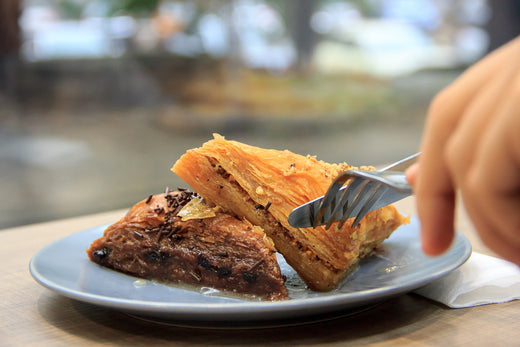
Health Benefits of Traditional Ingredients in Baklava and Other Sweets
Share
Baklava, along with many other traditional desserts, isn’t just a treat for the taste buds—it also incorporates ingredients that offer surprising health benefits. From nuts to honey, these components bring more than just flavor to your plate. Let’s dive into the healthful properties of the key ingredients found in baklava and similar sweets, highlighting how indulgence can sometimes be nourishing too.
1. Nuts: A Nutritional Powerhouse
Walnuts, pistachios, and almonds are the most common nuts used in baklava and other desserts. These nuts are packed with essential nutrients, including healthy fats, protein, vitamins, and minerals.
- Walnuts are rich in omega-3 fatty acids, which support brain health and reduce inflammation.
- Pistachios are loaded with antioxidants, particularly lutein and zeaxanthin, which are beneficial for eye health.
- Almonds provide vitamin E, a powerful antioxidant that promotes skin health and boosts the immune system.
Nuts also offer fiber, which aids digestion, and their healthy fats contribute to heart health by helping to lower bad cholesterol levels.
2. Honey: Nature’s Sweetener
Honey is a key ingredient in traditional baklava syrup and other sweets, valued not just for its sweetness but also for its health benefits.
- Antibacterial and Antioxidant Properties: Honey is rich in antioxidants and has natural antibacterial properties, which can help fight infections.
- Energy Boost: Its natural sugars provide a quick source of energy, making it a better alternative to refined sugar.
- Soothing for the Throat: Honey is also known for its soothing effects on sore throats and coughs.
When consumed in moderation, honey can be a healthier choice to satisfy your sweet tooth.
3. Spices: Flavor with Benefits
Many traditional sweets, including variations of baklava, incorporate spices like cinnamon and cardamom. These spices don’t just add warmth and complexity to the flavors; they also come with health benefits.
- Cinnamon: Known for its anti-inflammatory properties, cinnamon can help regulate blood sugar levels and improve heart health.
- Cardamom: Often called the "queen of spices," cardamom supports digestion and has antioxidant properties. It’s also believed to have detoxifying effects on the body.
4. Phyllo Dough: Light and Versatile
While phyllo dough may not be a direct health food, it is typically lighter and lower in fat compared to other pastry bases. Its thin, airy layers contribute to the dessert’s delicate texture without being overly dense or calorie-heavy.
5. Natural Sweeteners and Syrups
In addition to honey, many traditional sweets use molasses, date syrup, or fruit-based sweeteners. These natural alternatives are less processed than refined sugar and often contain trace amounts of vitamins and minerals.
6. Other Traditional Ingredients
- Rosewater and Orange Blossom Water: These fragrant ingredients, often used in Middle Eastern sweets, are known for their calming and soothing effects on the mind.
- Sesame Seeds and Tahini: Found in some variations of baklava and other desserts, sesame seeds and tahini are rich in calcium, magnesium, and healthy fats.
A Word on Balance
While these ingredients bring nutritional benefits, it’s important to remember that traditional sweets like baklava are still high in sugar and calories. Enjoying them in moderation allows you to reap their benefits without overindulging. Pairing sweets with tea or coffee can also slow down consumption and make the experience more enjoyable.
Conclusion
Baklava and similar traditional desserts showcase the perfect balance of flavor and nutrition. The nuts, honey, spices, and other ingredients not only create a harmonious taste but also provide essential nutrients and health benefits.
The next time you savor a piece of baklava, you can enjoy it with the knowledge that this delightful treat is rooted in centuries of culinary wisdom, blending indulgence with nourishment. After all, sweetness is even more enjoyable when it’s good for the body and the soul!
